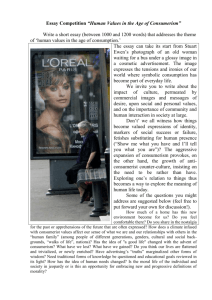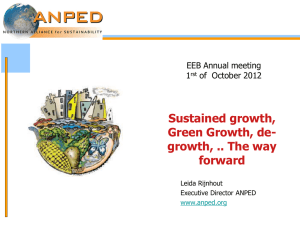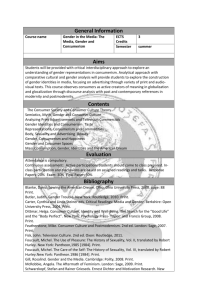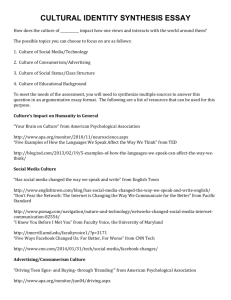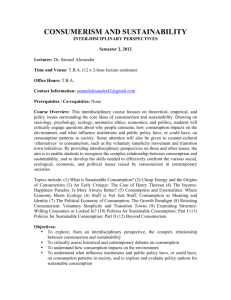Philosophy 220
advertisement
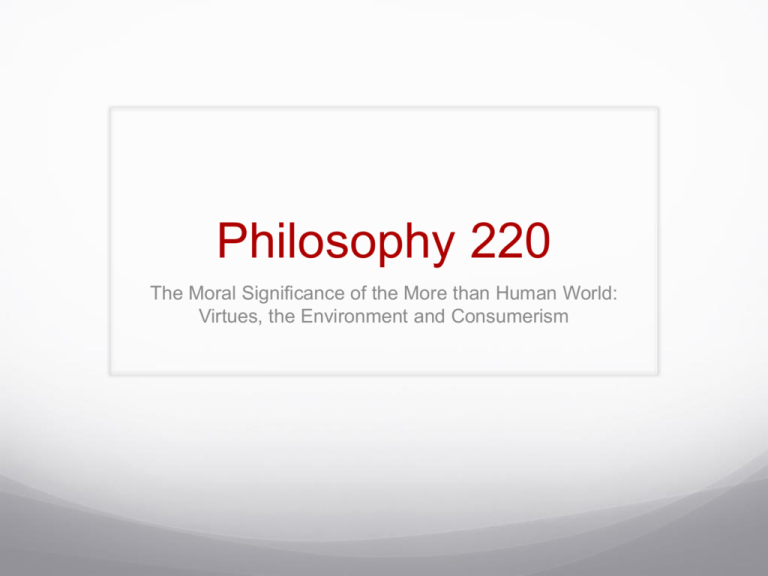
Philosophy 220 The Moral Significance of the More than Human World: Virtues, the Environment and Consumerism Hill, Jr., “Ideals of Human Excellence” Hill begins with the interesting example of the ‘wealthy eccentric.’ The question the example prompts is, “What sort of person would do a thing like that?” (624c1) This question points in the direction that Hill’s essay takes us. Though, as he argues, there is no suitably convincing way to prove that the destruction of nature is morally wrong, that’s not the end of the story. The focus on the rightness and wrongness of acts misses the morally significant analysis of the virtues indicated or highlighted by destructive actions. Our question about the eccentric points to a different sort of moral concern. Wrongness? Typical analyses of actions like those of the eccentric isolate relevant features of the action for scrutiny. We could contest certain sorts of conclusions about overall utility. We could consider the welfare and interests of non-animal life (plant rights?). We could argue from religious convictions about what God requires of us. All of these approaches, more or less plausible, ignore a question relevant to the virtuousness of the agents involved; namely, what the willingness to engage in the acts reveals about the character of the individuals involved. An Answer Hill’s response is not to insist that such a person lacks virtue (is not a virtuous person) but rather that, “…indifference to non-sentient nature…often signals the absence of certain traits which we want to encourage because they are, in most cases, a natural basis for the development of certain virtues” (626c1). Thus, though he is not willing to affirm that our eccentric necessarily lacks humility (the proper appreciation for one’s place in the natural order), the eccentric’s actions do indicate a certain kind of ignorance or narrowness of appreciation which is a likely precursor to humility. Some Responses Hill imagines a critic of his claim who would reject the idea that the eccentric's disdain for non-sentient nature is rooted in a kind of ignorance or failure of appreciation. A first response: knowledge of nature does not necessarily require moral concern (naturalistic fallacy). Hill: logical point is granted, but it is the case that familiarity typically increases concern. A second response: it is not knowledge that the destroyer is lacking, it is the proper perspective and this cosmic perspective doesn’t guarantee concern either Hill: true, but indifference is still usually a sign that one fails to see oneself as a part of the natural order. Furthermore, an appreciation of one's place in nature is not just an intellectual understanding, it requires humility. Humility For Hill, humility is an ability to measure importance without relation to oneself or something one identifies with (628c1). In this context, the critic has one more objection: to assert that an ideal humility requires us to view non-sentient nature as important for its own sake begs the question. Hill’s response is to specify the nature of this requirement: it is not conceptual but developmental. A positive expression of this sense of humility is self-acceptance as part of the natural order, subject to the same natural forces and limits of all other elements of the whole (629c2). Hill insists that experiencing nature promotes such a selfacceptance. The eccentric's failure may be one of refusing to see himself in this way. In Summary If Hill is right, though acts of natural destruction cannot be argued to be morally wrong, they can be criticized as resulting from defects in agents like the eccentric. These defects (ignorance, self-importance, and lack of selfacceptance, the latter two entailing a lack of the humility crucial to understanding one's place in the world) while not necessarily vicious in themselves do raise morally relevant questions about the character of these agents. Thus, Hill's environmental ethics focus not so much on the state of the environment itself, or on the rightness or wrongness of acts with environmental significance, but on human beings and their proper attitudes and dispositions to their environment. Wenz, “Environmental Virtues” Wenz begins by noting that from a virtue ethical standpoint, there doesn’t appear to be any conflict between anthropocentric and non-anthropocentric moral standpoints. For both, the traditional virtues produce agents whose actions are consistent with human and non-human flourishing. However, our economic system’s reliance on consumerism is inconsistent with these virtues, inasmuch as it presumes a range of dispositions inconsistent with virtue (vices). Thus, virtue ethics of either anthropocentric or non-anthropocentric varieties support the conclusion that consumerism is immoral. The fact that these perspectives support and enhance each other is the ‘synergy’ of the title. What is Consumerism? Consumerism is not the same as consumption. Consumption is an ineliminable part of life, as all living things need to consume energy to sustain themselves. Consumerism: “the ideology that society should maximize consumption, pursue consumption without limit” (632). This is the ideology that dominates much of global economic policy. It is also an ideology that pervades much of our thinking about ourselves and the world. Consumerism and the More than Human World A non-anthropocentric moral standpoint is committed to the DMS of the more than human world. As Wenz demonstrates (631c1-2), consumerism causes significant degradation of the more than human world. Global warming Pollution, resource use, species extinction Thus, from a non-anthropocentric moral standpoint, consumerism is immoral. Consumerism and Anthropocentrism For the anthropocentric moral view, human beings are the primary bearers of moral value. Wenz demonstrates that consumerism harms human beings apart from any collateral damage that might be done to the natural world. His argument here proceeds in two stages: he first discusses how consumerism harms poor people in the third world (63235), He then considers how consumerism harms “industrial people” in the developed world as well (635-37). The harm done to both these groups by a consumptiondriven lifestyle, leads to the conclusion that from the anthropocentric standpoint, consumerism is wrong. What about Virtue? Up to this point, much of the focus has been on the consequences for nature and for humans of the rampant consumerism which dominates our form of life. However, Wenz’s claim to a synergy between anthropocentric and non-anthropocentric moral views is ultimately tied to a common virtue ethical perspective. To close the loop, Wenz focuses our attention on the vices that consumerism encourages and the virtues that are common to both A and non-A views. The Vices Consumerism is rooted in what for ancient Greek virtue ethicists was a unifying vice: outdoing. Consumerism, in its call for endless progress, encourages us all to grab a much of the good stuff as possible, to see ourselves as competing against each other, “The Person with the Most Toys Wins” More specific vices that this ‘master vice’ encourage include: greed, avarice, gluttony, envy, pride, intemperance, selfishness and indifference. The Virtues By contrast, both anthropocentric and non-anthropocentric virtue ethical perspectives typically articulate a set of virtues (habits or dispositions to act), that are at odds with the goals and practices of consumerism. These virtues include: frugality, appreciation, temperance, self-development, dedication, generosity, benevolence. Though these virtues may be essentially human capacities, to the extent that they are consistent with the good of the more than human world, they receive non-anthropocentric support. A Philosophical Conclusion Though much of the energy of Wenz’s analysis is dedicated to the critique of consumerism, the primary philosophical accomplishment of the essay is to bridge the gap between anthropocentric and nonanthropocentric moral views. Though in the context of the question of the moral status of the more than human world, this gap looms large, Wenz argues that in particular cases (like the critique of consumerism) they overlap significantly and can be mutually reinforcing.
